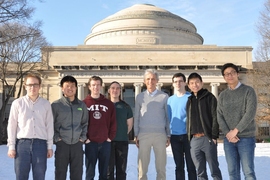CAMBRIDGE, Mass. – It promises to be a weighty moment: On Monday, May 20 (World Metrology Day) the definition for the kilogram, the base unit of mass, will change. You might not notice it when weighing fruits and vegetables at the grocery store, but the new definition could have positive implications for areas where extremely precise measurements are required, such as with the use of nanodevices, when concocting the correct dose of compounds used in a medicine, or when calculating the weight of a newly discovered subatomic particle.
On Monday, May 20 at 4:00 p.m., Professor Wolfgang Ketterle, the 2001 Nobel laureate in physics, will present a special lecture exploring the new standards of measurement and why this is such a historic shift for scientists around the world. Ketterle will delve into how, for the first time ever, the definition for the kilogram — as well as the definitions for the base units of charge, temperature, and mole — will shift from being based on physical objects that can change over time, to fundamental constants that scientists around the world will be able to reproduce.
Reporters are invited to attend to learn more about how this seemingly insignificant alteration to the underpinnings of our measurement system could not only help reduce uncertainty when calculating values using the international standards of measurement, but also help democratize access to the system of weights and measures so that it is no longer tied to a specific country or place.
WHAT:
World Metrology Day Special Lecture: The New Kilogram
Presented by Professor Wolfgang Ketterle, the 2001 Nobel Laureate in Physics
WHERE:
MIT’s Huntington Hall
Building 10, Room 250 (map: http://whereis.mit.edu/?go=10)
WHEN:
Monday, May 20, 2019
4:00 P.M. – 5:00 P.M.
Media RSVP:
Reporters interested in attending should email Abby Abazorius at abbya@mit.edu or expertrequests@mit.edu to RSVP and for more information.






